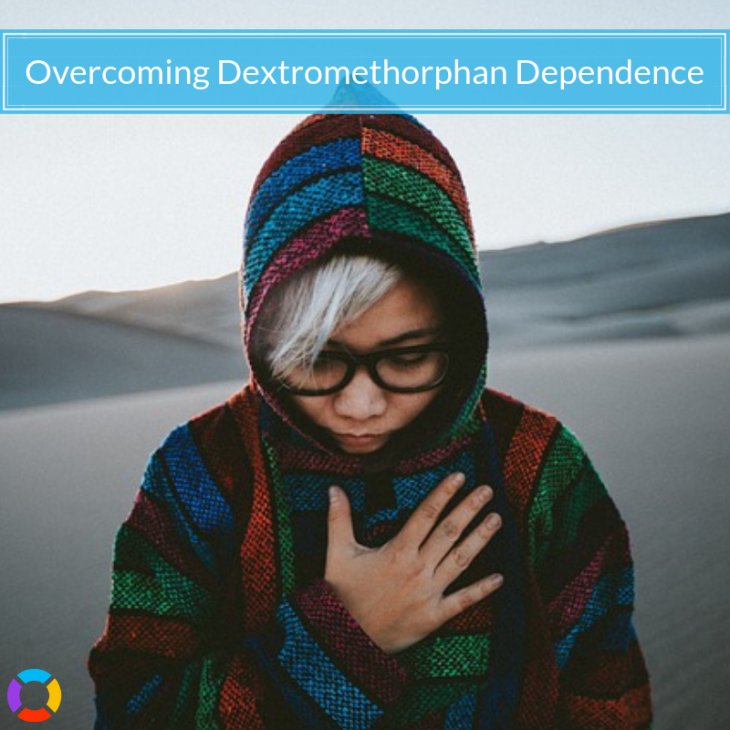DXM Withdrawal & Detox: Symptoms, Timeline & Getting Help

While prescriptions may be abused to the point of addiction, the same can apply to over the counter medications. In particular, dextromethorphan dependency can lead to health complications and negative side effects.
Read further to understand the warning signs of cough syrup abuse and the possible treatments available.
You don’t need to detox alone. Call now.
What is Dextromethorphan (DXM) and Why is It Abused?
Dextromethorphan (DXM) is an over the counter cough suppressant found in many common cold medications. Common medications include:
- DayQuil
- NyQuil
- Robitussin
- Mucinex
How dextromethorphan works is by decreasing activity in the part of the brain that prompts a person to cough. While it’s beneficial for battling colds and flus, it has a high potential for abuse or addiction when taken recreationally.
When DXM is taken in high doses, it acts as a dissociative, meaning it makes people feel separated or detached from their bodies or environment and causes euphoria and visual and/or auditory hallucinations.
On the street, dextromethorphan is often referred to as Robo, Skittles or Lean. Since it’s widely available at most retail stores and is inexpensive, it has become a popular substance among teens and young adults.
DXM abuse often starts with products you can buy in a drugstore. But high doses can lead to addiction, psychosis and dangerous withdrawal symptoms.
Drug Induced Psychosis
DXM is principally abused for its psychoactive effects which can result in drug induced psychosis, a dangerous condition characterized by the following symptoms:
- Paranoia or intense fear
- Auditory or visual hallucinations
- Delusional thinking
- Agitation or aggression
- Severe confusion or disorientation
- Potential insomnia, tremors or seizures
Is DXM Addictive? Understanding Tolerance and Dependence
When used intermittently to treat a cough, DXM can be used safely. However, when taken frequently and in high doses, its use can lead to tolerance and dependence. When DXM is abused, it changes how the brain responds to excitatory neurotransmitters. This begins the cycle of taking more frequent and higher doses of the drug to achieve the desired impact.
Individuals who’ve developed a dependence on DXM experience acute withdrawal symptoms that last on average up to 14 days. In some cases, individuals may develop post acute withdrawal syndrome or PAWS that can persist for up to two years. The acute withdrawal symptoms are primarily physical, while PAWS causes psychological and emotional symptoms.
One of DXM’s effects is that it leads to cross tolerance of other dissociative drugs such as ketamine or nitrous oxide to reach the desired effects.
Signs of DXM dependence may include:
- Needing larger doses to feel its effects
- Using DXM to feel “normal”
- Hiding or mixing medications
- Withdrawal symptoms between doses
Symptoms of Cough Syrup Withdrawal
Withdrawal from DXM abuse can consist of physical and psychological symptoms. They range from mild to severe and depend on the severity of the addiction, a person’s genetics, their weight and overall physical condition, as well as any co-occurring mental health or other substance use disorders.
Physical and Emotional Symptoms of DXM Withdrawal
Here are some common DXM withdrawal symptoms:
- Fatigue
- Lack of energy or motivation
- Muscle or bone aches or discomfort
- Nausea
- Vomiting
- Sweating
- Depression
- Feeling sad or hopeless
- Anxiety and nervousness
- Irritability
- Mood swings and emotional instability
- Cravings to use DXM again
- Rare, but can lead to toxic psychosis
DXM Withdrawal Timeline: What to Expect Week to Week
The exact timeline for withdrawal from DXM depends on several factors.
Consider the severity of the addiction, dosage and frequency of use and any polydrug use.
- Days 1-2: Symptoms begin, including anxiety, irritability and insomnia
- Days 3-7: Peak symptoms can consist of vomiting, chills and cravings
- Week 2: Symptoms start to improve, but mood effects persist
- Weeks 3+: Some individuals will experience PAWS, including insomnia, low mood and apathy
“How long does DXM withdrawal last?” On average, DXM withdrawal lasts 14 days. For some, they may experience PAWS, which can last about two years.
Dangers of Withdrawal: Why Cold Turkey Can Be Risky
In general, withdrawal from DXM is uncomfortable and usually not life threatening. These symptoms can be more severe when a person attempts to go “cold turkey” or stop their use without tapering the doses.
These symptoms can be so intense that an individual may restart DXM to alleviate their discomfort. This puts them at risk for drug overdose.
Along with the intense physical reaction of coming off DXM, individuals may experience severe depression that can lead to suicidal thoughts. Although rare, a drug-induced psychosis may occur due to the sudden discontinuation of the substance.
For these reasons, individuals with moderate to severe addiction or those who lack strong support systems or have co-occurring disorders should consider a medically supervised detox program.
High doses of DXM can cause toxic psychosis, especially if you stop suddenly after heavy use.
How to Detox From Cough Syrup Safely
Addiction professionals recommend medically supervised detox or tapering under medical guidance for individuals with DXM addiction.
This is especially important for folks with moderate to severe addiction or a long history of DXM use. These individuals benefit from inpatient detox that ensures around-the-clock medical supervision and the earliest opportunities for interventions if any complications arise.
For those with mild or moderate use, an outpatient detox program with tapering guidance and emotional support is a much better option than going it alone.
What is Included in a Professional DXM Detox?
- Tapering plans
- Medications for symptom relief
- 24/7 medical monitoring
- Psychological screenings
DXM Detox Treatment: Medications and Therapies
Although there are no FDA-approved prescriptions currently available to treat DXM withdrawal, medications can alleviate withdrawal symptoms. These include antidiarrheals, antiemetics and sleep aids. Individuals experiencing symptoms of dextromethorphan and depression can benefit from antidepressants, especially SSRIs.
Participating in behavioral therapies is another beneficial intervention during the DXM detox process.
These include cognitive behavioral therapy (CBT), motivational interviewing (MI), and contingency management to help you understand the underlying causes of addiction, provide ways to change unhealthy behaviors and coping skills and plan for a future where addiction is no longer in control.
Detox is just the first step on the recovery journey. Participating in a rehab program is the next best step to help prevent relapse and support long term sobriety.
Self Care and Home Strategies (if Detoxing with Support)
Although it’s possible to detox from DXM at home, consider several aspects before going it alone. This includes being prepared to deal with symptoms such as tremors, sweating and G.I. upset that can lead to dehydration.
The risk of paranoia, hallucinations or delusions can cause unpredictable behaviors and overdose risks due to the resumption of DXM to ease uncomfortable withdrawal symptoms.
Home Care Tips to Manage Mild Withdrawal
- Stay hydrated and maintain a nutritious diet to prevent dehydration or electrolyte imbalances.
- Rest.
- Take relaxing baths or showers to decrease agitation, anxiety, body aches and nausea.
- Gentle exercise, like walking outside, meditation, yoga or mindfulness practices to distract from the discomfort and provide an outlet for anxiety or agitation.
- Stay connected to your support system, such as family, friends, medical professionals or recovery support groups. This helps to prevent isolation and keeps your mind off cravings or discomfort.
Supporting a Loved One Through DXM Withdrawal
Families and loved ones play critical roles during DXM withdrawal. Here are several ways to support a loved one going through this process:
- Keeping DXM containing products out of the home and reducing identifiable triggers in their environment.
- Being supportive and understanding while maintaining boundaries that don’t enable unhealthy behaviors.
- Encouraging open communication through a safe and nonjudgmental space that allows individuals to express their feelings and manage their emotions.
- Helping them to find a treatment program or recovery support group that meets their needs.
- Being willing to go to counseling with them to address issues and build a future recovery.
- Being their cheerleader and celebrating successes and providing encouragement even if things don’t go well.
Life After DXM Detox: What Comes Next?
Detox is the first step toward a future in recovery. While extremely important, it isn’t addiction treatment. Long term recovery requires ongoing support that helps identify underlying causes of behaviors or unhealthy coping skills that contribute to the chaos and instability that often comes with addiction.
There’s no one size fits all approach to DXM addiction treatment. Some individuals need more intensive treatment and support via inpatient or residential treatment programs, while others find the help they need through outpatient programs.
What’s critical is a comprehensive treatment plan that addresses your unique treatment needs.
Through a mix of psychotherapy approaches such as CBT or contingency management, you can work through past trauma, understand how triggers impact sobriety, learn healthy coping skills and develop a relapse prevention plan that includes peer support and engagement.
Conclusion: Help is Available for Cough Syrup Withdrawal
There’s hope for individuals experiencing dextromethorphan abuse. Across the country, there are treatment programs and addiction professionals that provide the help needed to build a future without the day to day struggle of active addiction.
Finding the help you or a loved one needs is just a click away. Websites like Detox.com provide a database where you can filter treatment programs by location, cost, and amenities. A future where recovery from dextromethorphan addiction is a phone call away. Call a treatment program today!



